Fleurs du Mal Magazine


Or see the index
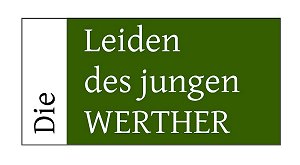 The Sorrows of Young Werther (32) by J.W. von Goethe ♦ AUGUST 30. ♦ Unhappy being that I am! Why do I thus deceive myself? What is to come of all this wild, aimless, endless passion? I cannot pray except to her.
The Sorrows of Young Werther (32) by J.W. von Goethe ♦ AUGUST 30. ♦ Unhappy being that I am! Why do I thus deceive myself? What is to come of all this wild, aimless, endless passion? I cannot pray except to her.
My imagination sees nothing but her: all surrounding objects are of no account, except as they relate to her. In this dreamy state I enjoy many happy hours, till at length I feel compelled to tear myself away from her. Ah, Wilhelm, to what does not my heart often compel me! When I have spent several hours in her company, till I feel completely absorbed by her figure, her grace, the divine expression of her thoughts, my mind becomes gradually excited to the highest excess, my sight grows dim, my hearing confused, my breathing oppressed as if by the hand of a murderer, and my beating heart seeks to obtain relief for my aching senses. I am sometimes unconscious whether I really exist. If in such moments I find no sympathy, and Charlotte does not allow me to enjoy the melancholy consolation of bathing her hand with my tears, I feel compelled to tear myself from her, when I either wander through the country, climb some precipitous cliff, or force a path through the trackless thicket, where I am lacerated and torn by thorns and briers; and thence I find relief. Sometimes I lie stretched on the ground, overcome with 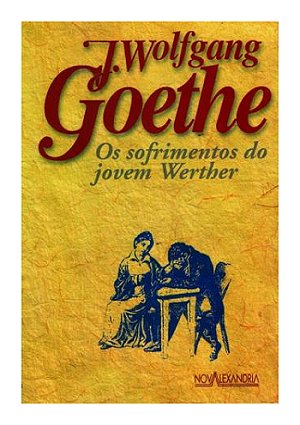 fatigue and dying with thirst; sometimes, late in the night, when the moon shines above me, I recline against an aged tree in some sequestered forest, to rest my weary limbs, when, exhausted and worn, I sleep till break of day. O Wilhelm! the hermit’s cell, his sackcloth, and girdle of thorns would be luxury and indulgence compared with what I suffer. Adieu! I see no end to this wretchedness except the grave.
fatigue and dying with thirst; sometimes, late in the night, when the moon shines above me, I recline against an aged tree in some sequestered forest, to rest my weary limbs, when, exhausted and worn, I sleep till break of day. O Wilhelm! the hermit’s cell, his sackcloth, and girdle of thorns would be luxury and indulgence compared with what I suffer. Adieu! I see no end to this wretchedness except the grave.
♦ SEPTEMBER 3. ♦ I must away. Thank you, Wilhelm, for determining my wavering purpose. For a whole fortnight I have thought of leaving her. I must away. She has returned to town, and is at the house of a friend. And then, Albert–yes, I must go.
The Sorrows of Young Werther (Die Leiden des jungen Werther) by J.W. von Goethe. Translated by R.D. Boylan
To be continued
fleursdumal.nl magazine for art & literature
More in: -Die Leiden des jungen Werther, Goethe, Johann Wolfgang von
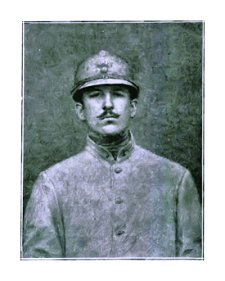
Alan Seeger
(1888-1916)
The Need to Love
The need to love that all the stars obey
Entered my heart and banished all beside.
Bare were the gardens where I used to stray;
Faded the flowers that one time satisfied.
Before the beauty of the west on fire,
The moonlit hills from cloister-casements viewed,
Cloud-like arose the image of desire,
And cast out peace and maddened solitude.
I sought the City and the hopes it held:
With smoke and brooding vapors intercurled,
As the thick roofs and walls close-paralleled
Shut out the fair horizons of the world —
A truant from the fields and rustic joy,
In my changed thought that image even so
Shut out the gods I worshipped as a boy
And all the pure delights I used to know.
Often the veil has trembled at some tide
Of lovely reminiscence and revealed
How much of beauty Nature holds beside
Sweet lips that sacrifice and arms that yield:
Clouds, window-framed, beyond the huddled eaves
When summer cumulates their golden chains,
Or from the parks the smell of burning leaves,
Fragrant of childhood in the country lanes,
An organ-grinder’s melancholy tune
In rainy streets, or from an attic sill
The blue skies of a windy afternoon
Where our kites climbed once from some grassy hill:
And my soul once more would be wrapped entire
In the pure peace and blessing of those years
Before the fierce infection of Desire
Had ravaged all the flesh. Through starting tears
Shone that lost Paradise; but, if it did,
Again ere long the prison-shades would fall
That Youth condemns itself to walk amid,
So narrow, but so beautiful withal.
And I have followed Fame with less devotion,
And kept no real ambition but to see
Rise from the foam of Nature’s sunlit ocean
My dream of palpable divinity;
And aught the world contends for to mine eye
Seemed not so real a meaning of success
As only once to clasp before I die
My vision of embodied happiness.
Alan Seeger poetry
fleursdumal.nl magazine
More in: Archive S-T, Seeger, Alan
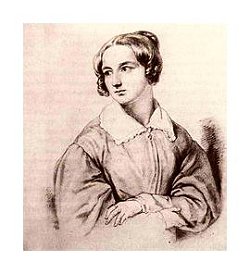
Luise Hensel
(1798-1876)
Zug der Liebe
Ach! vergessen könnt’ ich nimmer
Seiner Liebe, Seiner Pein.
Sein gedenken will ich immer;
Garten, Feld und Wald und Zimmer
Soll mir stets ein Bethaus sein.
Stündlich will ich Ihn begrüßen:
»Sei gepriesen, süßer Freund!«
Alle Blumen, die da sprießen,
Will ich mit dem Thau begießen,
Den um Ihn mein Auge weint. –
Keine Gaben, keine Freuden,
Keine Krone dieser Welt!
Freudig will ich Alles meiden,
Will nur Er von mir nicht scheiden,
Den mein Herz so innig hält.
Wer ein Tröpflein durfte trinken,
Herr! aus Deinem Gnadenmeer,
Der muß ganz darin versinken,
Folgen einzig Deinen Winken
Ohne Sinne, ohn’ Gehör.
Und ich kann Dich nimmer lassen,
Ewig halt’ ich Dich umarmt.
Wolltest Du mich fliehn und hassen,
Müßt’ ich noch Dein Kreuz umfassen,
Bis es jeden Stein erbarmt.
Wärst Du nicht im Himmel drinnen,
Nimmer sehnt’ ich mich hinein. –
All mein Wissen, all mein Sinnen,
Herr! laß ganz in Dich verrinnen,
Ganz in Dir verloren sein.
Münster, Sommer 1819.
Luise Hensel poetry
fleursdumal.nl magazine
More in: Archive G-H, CLASSIC POETRY
 The Sorrows of Young Werther (31) by J.W. von Goethe ♦ AUGUST 28. ♦ If my ills would admit of any cure, they would certainly be cured here. This is my birthday, and early in the morning I received a packet from Albert. Upon opening it, I found one of the pink ribbons which Charlotte wore in her dress the first time I saw her, and which I had several times asked her to give me. With it were two volumes in duodecimo of Wetstein’s “Homer,” a book I had often wished for, to save me the inconvenience of carrying the large Ernestine edition with me upon my walks. You see how they anticipate my wishes, how well they understand all those little attentions of friendship, so superior to the costly presents of the great, which are humiliating. I kissed the ribbon a thousand times, and in every breath inhaled the remembrance of those happy and irrevocable days which filled me with the keenest joy. Such, Wilhelm, is our fate. I do not murmur at it: the flowers of life are but visionary. How many pass away, and leave no trace behind–how few yield any fruit–and the fruit itself, how rarely does it ripen! And yet there are flowers enough! and is it not strange, my friend, that we should suffer the little that does really ripen, to rot, decay, and perish unenjoyed? Farewell! This is a glorious summer. I often climb into the trees in Charlotte’s orchard, and shake down the pears that hang on the highest branches. She stands below, and catches them as they fall.
The Sorrows of Young Werther (31) by J.W. von Goethe ♦ AUGUST 28. ♦ If my ills would admit of any cure, they would certainly be cured here. This is my birthday, and early in the morning I received a packet from Albert. Upon opening it, I found one of the pink ribbons which Charlotte wore in her dress the first time I saw her, and which I had several times asked her to give me. With it were two volumes in duodecimo of Wetstein’s “Homer,” a book I had often wished for, to save me the inconvenience of carrying the large Ernestine edition with me upon my walks. You see how they anticipate my wishes, how well they understand all those little attentions of friendship, so superior to the costly presents of the great, which are humiliating. I kissed the ribbon a thousand times, and in every breath inhaled the remembrance of those happy and irrevocable days which filled me with the keenest joy. Such, Wilhelm, is our fate. I do not murmur at it: the flowers of life are but visionary. How many pass away, and leave no trace behind–how few yield any fruit–and the fruit itself, how rarely does it ripen! And yet there are flowers enough! and is it not strange, my friend, that we should suffer the little that does really ripen, to rot, decay, and perish unenjoyed? Farewell! This is a glorious summer. I often climb into the trees in Charlotte’s orchard, and shake down the pears that hang on the highest branches. She stands below, and catches them as they fall.
The Sorrows of Young Werther (Die Leiden des jungen Werther) by J.W. von Goethe. Translated by R.D. Boylan
To be continued
fleursdumal.nl magazine for art & literature
More in: -Die Leiden des jungen Werther, Goethe, Johann Wolfgang von
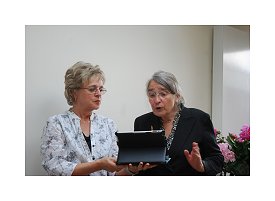
Emma Crebolder (R) & Heilna du Plooy (L)
Vertaalvrucht (nr 3): Emma Crebolder & Heilna du Plooy
Literaire Salon in’t Wevershuisje 3
Ons vruchtbaarst verleden
Ons vruchtbaarst verleden lag
in geschriften en bij rivieren, op
keien of stenen aan Schelde of Waal.
De stroming sleepte ons mee.
We moesten de verhalen vinden.
Schorrevaar is achtergebleven. Ze
speelt met uitgeklapte vleugels voor
boek. Ze omvangt de meeuw en
gooit haar trots mijlenver op en wijst,
kijk daar: vriendin van schorrevaar.
Emma Crebolder
Ons vrugbaarste verlede
Ons vrugbaarste verlede is op papier
en langs riviere vasgelê, op die keie
of klippe langs die Schelde of die Waal.
Die stroming het ons meegevoer.
Ons moes na die verhale soek.
Waterraaf het agtergebly. Sy flap
haar vlerke soos ’n boek wyd oop.
Sy omhels die meeu en gooi haar
trots hoog op in die lug en wys,
kyk daar: die vriendin van waterraaf.
Heilna du Plooy
Vertaling naar het Zuidafrikaans
Vertaalvrucht (nr 3): Emma Crebolder & Heilna du Plooy
Literaire Salon in’t Wevershuisje 3, foto Carina van der Walt
Gedicht en vertaling eerder gepubliceerd in Literair Tijdschrift Ambrozijn, Brugge
fleursdumal.nl magazine
More in: Archive C-D, Crebolder, Emma, Heilna du Plooy, Literaire Salon in 't Wevershuisje, LITERARY MAGAZINES
Acht vertalingen van gedichten van T.T. Cloete (1924) door Carina van der Walt & Geno Spoormans
T.T. Cloete
rokke
juwele die onthou ek eintlik nie
van hoede toentertyd met tulle
onthou ek vaag maar rokke
so baie helderte het ek van húlle
daar was die houtskoolrok
met loodgrijs kolle Tarentaal
die een met troupantkleure
haar naam was Fluister-Asemhaal-
van-Blomme as jy loop
of hier en daar selfs in ’n stoel
doodstil rondsit
die bloue was My-Hartklop-Voel-
Onder-My-Bors
die swart-en-wit gestreepte een Sebra
vir meestal saans
met uitgaan dra
en dan die Pronksingvink
die een met swart-en-geel
sy hang ’n graspluim in die wind
wat oor haar saggies streel
daar was die nuwerwetse een
met ingeweefde kreuk
hoe mens haar ook al was of stryk
met byna vleeslik haar eksoties Vreemde Reuk
een was ’n hele Ruim Landskap
die lemmetjiegroene
vol grasveld water sonne geel
lemoene
en toe jy kwalik was en skuifelend
het ons ’n nuwe wéér gekoop
en lieg-lieg-lag-lag het ons haar
Stilstreel-Saggies-Soen gedoop
en dan was daar ’n allerlaaste een
ontwerp deur hartseerliefde nee
so menslik op ons afgedwing
te onvertaalbaar nee
om haar ’n naam te gee
T.T. Cloete
jurken
juwelen herinner ik me eigenlijk niet
hoeden met tule toentertijd
onthoud ik vaag maar jurken
staan mij voor ogen in volle helderheid
er was een houtskooljurk
met loodgrijze stippen Parelhoen
een scharrelaar vol bonte kleuren
haar naam was Nog-Zachter-Doen-
dan-Bloemen als je liep
of hier en daar zelfs in stoelen
doodstil wat rondhing
de blauwe was Mijn-Hartslag-Voelen-
Onder-Mijn-Borst
de zwart-wit gestreepte Zebra
meestal voor ’s avonds
bij een gala
en dan de Pronkzingvink
die ene in zwarten en gelen
zij hangt als rietpluimen in de wind
die zachtjes over haar strelen
dan was er eentje niet te strijken
van een hoogst modern tailleur
met ingeweven kreuken
en haar bijna lijfelijk exotische Vreemde Geur
een was een heel Ruim Landschap
het limoengroene
veld vol gras water zon en gele
citroenen
en toen je nog maar kwalijk was en schuifelde
hebben we wéér een nieuwe gehaald
en steels stout hebben we haar
als Stilletjes-Zachtjes-Zoenen vertaald
en dan was er de allerlaatste
ontworpen door treurliefde nee
zo doodgewoon aan het leven
te onvertaalbaar
om haar een naam te geven
T.T. Cloete 8 gedichten: Vertalingen uit het Zuid-Afrikaans door Carina van der Walt & Geno Spoormans, 2010 – slot gedicht 1-8
fleursdumal.nl magazine
More in: Archive C-D, T .T. Cloete, Walt & Spoormans
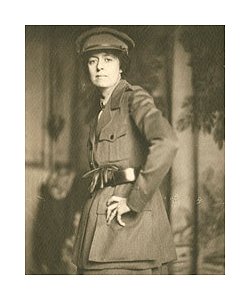
Eunice Tietjens
(1884 – 1944)
The Dandy
He swaggers in green silk and his two coats are lined
with fur. Above his velvet shoes his trim, bound
ankles twinkle pleasantly.
His nails are of the longest.
Quite the glass of fashion is Mr. Chu!
In one slim hand–the ultimate punctilio–dangles
a bamboo cage, wherein a small brown bird sits
with a face of perpetual surprise.
Mr. Chu smiles the benevolent smile of one who satisfies
both fashion and a tender heart.
Does not a bird need an airing?
(Wusih)
Eunice Tietjens poetry
fleursdumal.nl magazine
More in: Archive S-T, Tietjens, Eunice
 The Sorrows of Young Werther (30) by J.W. von Goethe ♦ AUGUST 21. ♦ In vain do I stretch out my arms toward her when I awaken in the morning from my weary slumbers. In vain do I seek for her at night in my bed, when some innocent dream has happily deceived me, and placed her near me in the fields, when I have seized her hand and covered it with countless kisses. And when I feel for her in the half confusion of sleep, with the happy sense that she is near, tears flow from my oppressed heart; and, bereft of all comfort, I weep over my future woes.
The Sorrows of Young Werther (30) by J.W. von Goethe ♦ AUGUST 21. ♦ In vain do I stretch out my arms toward her when I awaken in the morning from my weary slumbers. In vain do I seek for her at night in my bed, when some innocent dream has happily deceived me, and placed her near me in the fields, when I have seized her hand and covered it with countless kisses. And when I feel for her in the half confusion of sleep, with the happy sense that she is near, tears flow from my oppressed heart; and, bereft of all comfort, I weep over my future woes.
♦ AUGUST 22. ♦ What a misfortune, Wilhelm! My active spirits have degenerated into contented indolence. I cannot be idle, and yet I am unable to set to work. I cannot think: I have no longer any feeling for the beauties of nature, and books are distasteful to me. Once we give ourselves up, we are totally lost. Many a time and oft I wish I were a common labourer; that, awakening in the morning, I might have but one prospect, one pursuit, 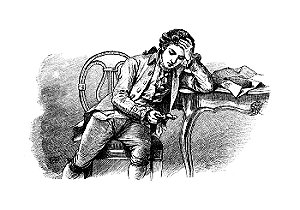 one hope, for the day which has dawned. I often envy Albert when I see him buried in a heap of papers and parchments, and I fancy I should be happy were I in his place. Often impressed with this feeling I have been on the point of writing to you and to the minister, for the appointment at the embassy, which you think I might obtain. I believe I might procure it. The minister has long shown a regard for me, and has frequently urged me to seek employment. It is the business of an hour only. Now and then the fable of the horse recurs to me. Weary of liberty, he suffered himself to be saddled and bridled, and was ridden to death for his pains. I know not what to determine upon. For is not this anxiety for change the consequence of that restless spirit which would pursue me equally in every situation of life?
one hope, for the day which has dawned. I often envy Albert when I see him buried in a heap of papers and parchments, and I fancy I should be happy were I in his place. Often impressed with this feeling I have been on the point of writing to you and to the minister, for the appointment at the embassy, which you think I might obtain. I believe I might procure it. The minister has long shown a regard for me, and has frequently urged me to seek employment. It is the business of an hour only. Now and then the fable of the horse recurs to me. Weary of liberty, he suffered himself to be saddled and bridled, and was ridden to death for his pains. I know not what to determine upon. For is not this anxiety for change the consequence of that restless spirit which would pursue me equally in every situation of life?
The Sorrows of Young Werther (Die Leiden des jungen Werther) by J.W. von Goethe. Translated by R.D. Boylan
To be continued
fleursdumal.nl magazine for art & literature
More in: -Die Leiden des jungen Werther, Goethe, Johann Wolfgang von

Rob Stuart: Mind the Gap
fleursdumal.nl magazine
More in: *Concrete + Visual Poetry P-T, Rob Stuart, Rob Stuart, Stuart, Rob

Heinrich Heine
(1797-1856)
An einen politischen Dichter
Du singst, wie einst Tyrtäus sang,
Von Heldenmut beseelet,
Doch hast du schlecht dein Publikum
Und deine Zeit gewählet.
Beifällig horchen sie dir zwar,
Und loben, schier begeistert:
Wie edel dein Gedankenflug,
Wie du die Form bemeistert.
Sie pflegen auch beim Glase Wein
Ein Vivat dir zu bringen
Und manchen Schlachtgesang von dir
Lautbrüllend nachzusingen.
Der Knecht singt gern ein Freiheitslied
Des Abends in der Schenke:
Das fördert die Verdauungskraft,
Und würzet die Getränke.
Heinrich Heine poetry
fleursdumal.nl magazine
More in: Archive G-H, Heine, Heinrich
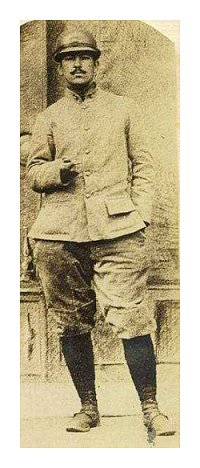
Alan Seeger
(1888-1916)
Ode in Memory of the American Volunteers Fallen for France
I
Ay, it is fitting on this holiday,
Commemorative of our soldier dead,
When–with sweet flowers of our New England May
Hiding the lichened stones by fifty years made gray —
Their graves in every town are garlanded,
That pious tribute should be given too
To our intrepid few
Obscurely fallen here beyond the seas.
Those to preserve their country’s greatness died;
But by the death of these
Something that we can look upon with pride
Has been achieved, nor wholly unreplied
Can sneerers triumph in the charge they make
That from a war where Freedom was at stake
America withheld and, daunted, stood aside.
II
Be they remembered here with each reviving spring,
Not only that in May, when life is loveliest,
Around Neuville-Saint-Vaast and the disputed crest
Of Vimy, they, superb, unfaltering,
In that fine onslaught that no fire could halt,
Parted impetuous to their first assault;
But that they brought fresh hearts and springlike too
To that high mission, and ’tis meet to strew
With twigs of lilac and spring’s earliest rose
The cenotaph of those
Who in the cause that history most endears
Fell in the sunny morn and flower of their young years.
III
Yet sought they neither recompense nor praise,
Nor to be mentioned in another breath
Than their blue coated comrades whose great days
It was their pride to share–ay, share even to the death!
Nay, rather, France, to you they rendered thanks
(Seeing they came for honor, not for gain),
Who, opening to them your glorious ranks,
Gave them that grand occasion to excel,
That chance to live the life most free from stain
And that rare privilege of dying well.
IV
O friends! I know not since that war began
From which no people nobly stands aloof
If in all moments we have given proof
Of virtues that were thought American.
I know not if in all things done and said
All has been well and good,
Or if each one of us can hold his head
As proudly as he should,
Or, from the pattern of those mighty dead
Whose shades our country venerates to-day,
If we’ve not somewhat fallen and somewhat gone astray.
But you to whom our land’s good name is dear,
If there be any here
Who wonder if her manhood be decreased,
Relaxed its sinews and its blood less red
Than that at Shiloh and Antietam shed,
Be proud of these, have joy in this at least,
And cry: “Now heaven be praised
That in that hour that most imperilled her,
Menaced her liberty who foremost raised
Europe’s bright flag of freedom, some there were
Who, not unmindful of the antique debt,
Came back the generous path of Lafayette;
And when of a most formidable foe
She checked each onset, arduous to stem —
Foiled and frustrated them —
On those red fields where blow with furious blow
Was countered, whether the gigantic fray
Rolled by the Meuse or at the Bois Sabot,
Accents of ours were in the fierce melee;
And on those furthest rims of hallowed ground
Where the forlorn, the gallant charge expires,
When the slain bugler has long ceased to sound,
And on the tangled wires
The last wild rally staggers, crumbles, stops,
Withered beneath the shrapnel’s iron showers: —
Now heaven be thanked, we gave a few brave drops;
Now heaven be thanked, a few brave drops were ours.”
V
There, holding still, in frozen steadfastness,
Their bayonets toward the beckoning frontiers,
They lie–our comrades–lie among their peers,
Clad in the glory of fallen warriors,
Grim clusters under thorny trellises,
Dry, furthest foam upon disastrous shores,
Leaves that made last year beautiful, still strewn
Even as they fell, unchanged, beneath the changing moon;
And earth in her divine indifference
Rolls on, and many paltry things and mean
Prate to be heard and caper to be seen.
But they are silent, calm; their eloquence
Is that incomparable attitude;
No human presences their witness are,
But summer clouds and sunset crimson-hued,
And showers and night winds and the northern star.
Nay, even our salutations seem profane,
Opposed to their Elysian quietude;
Our salutations calling from afar,
From our ignobler plane
And undistinction of our lesser parts:
Hail, brothers, and farewell; you are twice blest, brave hearts.
Double your glory is who perished thus,
For you have died for France and vindicated us.
Alan Seeger: Ode in Memory of the American Volunteers Fallen for France
(To have been read before the statue of Lafayette and Washington in Paris, on Decoration Day, May 30, 1916.)
fleursdumal.nl magazine
More in: Archive S-T, Seeger, Alan
Kate Tempest: Brand New Ancients On Film
– Part 3 –
In November 2013, performance poet Kate Tempest and Battersea Arts Centre, embarked on a journey together to tour the award winning show Brand New Ancients.
The tour includes 9 London venues including the Royal Opera House, Harrow Arts Centre, Lyric Hammersmith and Battersea Arts Centre, as well as 5 regional venues across the country from Contact in Manchester to Brighton Dome as well as heading to New York at St. Ann’s Warehouse.
In collaboration with director Joe Roberts, Battersea Arts Centre has produced three short films interpreting Kate’s spoken word through moving image, which will be released across the tour.
This is the third of the three part series:
Part one can be found here: http://www.youtube.com/watch?v=JLWlB3ib7ZM
Part two can be found here: http://www.youtube.com/watch?v=UpqJZrVwZTw
Directed by Joe Roberts
Drawings by Mista Breakfast
Movement and composition by Berkavitch.
Produced by Battersea Arts Centre
Brand New Ancients is written by Kate Tempest
A Kate Tempest & Battersea Arts Centre Co-production
Co-commissioned by the Albany
More info and tickets: # http://brandnewancientstour.com/
15 apr. 2014
kate tempest poetry
fleursdumal.nl magazine
More in: Archive S-T, AUDIO, CINEMA, RADIO & TV, Kate/Kae Tempest, Tempest, Kate/Kae
Thank you for reading Fleurs du Mal - magazine for art & literature